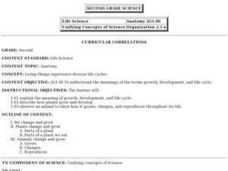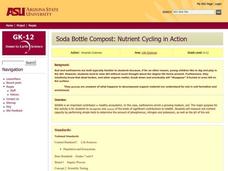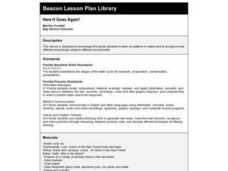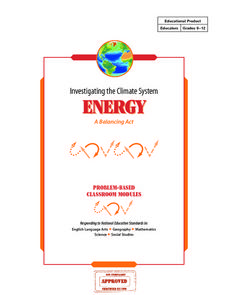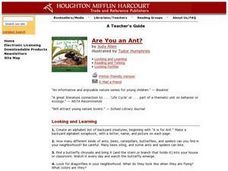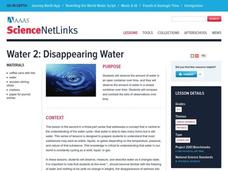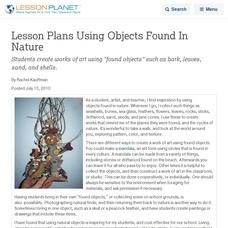Curated OER
Butterfly Life Cycle
Second graders explore biology. In this life cycle lesson, 2nd graders act out the stages a caterpillar goes through to become a butterfly. They spend days prior to this lesson observing caterpillars they have collected and developing...
Curated OER
Recycle Lifecycle
Young scholars investigate the recycling process. In this recycling lesson, students read the article The Recycling Process After Collection and discuss the advantages of recycling. As an extension activity, young scholars simulate the...
Curated OER
Changes in Nature
Fifth graders explore changes in nature. They identify chemical and physical changes in the water cycle, carbon cycle, and weathering. Students explore a chemical or physical change based on a chemical formula. They examine the effects...
Curated OER
Living Things Experience Diverse Life Cycles
Second graders will study and explain the meaning of growth, development, and life cycle. They describe how plants grow and develop and observe an animal to show how it grows, changes, and reproduces throughout its life.
NOAA
The Incredible Carbon Journey: Play the Carbon Journey Game
Class members explore the carbon cycle in the final installment of the 10-part Discover Your Changing World series. They play a simulation game where they walk through the steps carbon takes as it cycles through the different layers of...
California Academy of Science
Carbon Cycle Role Play
Anytime you make concepts clear with role playing or hands-on experience, it's a win for the whole class. Ping-Pong balls are used to represent carbon in a carbon cycle role-play activity. In small groups, children first discuss what...
Curated OER
A Model for Natural Selection- Spaghetti Worms
Does the early bird really get the worm? If so, which color of worm does it prefer? In an exciting and easy week-long field investigation, young field biologists set up a one square meter feeding area for birds. If you have a webcam,...
Curated OER
Soda Bottle Compost: Nutrient Cycling in Action
Students investigate, through their own experimentation, the important role wildlife play in nutrient cycling. Earthworms and compost are used in this experiment and different experimental setups be evaluated.
K-State Research and Extensions
Water
How are maps like fish? They both have scales. The chapter includes six different activities at three different levels. Scholars complete activities using natural resources, learn how to read a map, see how to make a compass rosette,...
Curated OER
Here It Goes Again!
First graders work on patterns in nature and to recognize how different living things adapt to different environments such as the rain forest.
Curated OER
The Very Hungry Caterpillar
Read the story, The Very Hungry Caterpillar, and complete activities from multiple subjects. Make a mural, create a class graph, discuss the life cycle of a butterfly, research information about butterflies on the Internet and make a...
Curated OER
The Water We Drink
Third graders relate that the quality of their drinking water is subject to the condition of the environment and water found in streams and creeks in their community. They track the travel of a wad of paper from a student's desk to a...
Earth Day Network
Conserving Water Through Art!
Having fresh, clean drinking water is a privilege many people take for granted. Help raise awareness about the scarcity of water and the importance of conservation by discussing different ways water is used in everyday life. Brainstorm...
Curated OER
Investigating the Climate System: Energy, A Balancing Act
Earth science explorers design an experiment to demonstrate that the albedo of a surface affects its temperature. They test to find out if moisture on the surface affects temperature. They discover whether or not concrete or asphalt heat...
Curated OER
Are You an Ant?
Students investigate different insects in their backyard. In this insect lesson, students read the book Are You and Ant? and apply the reading to their backyards. Students create a list of animals that begin with the the letter A an make...
Curated OER
Plant Life Cycle Activities and Lesson Plans
Curb spring fever by bringing some of the great outdoors into your classroom with plant life cycle activities.
Curated OER
Water, Water Everywhere and Not a Drop to Drink
Students identify the different stages in the water cycle. In this environmental science lesson plan, students research about different water pollutants in watershed. They describe ways to purify water.
Curated OER
Disappearing Water
Students explore the water cycle. In this earth science lesson, students observe and measure water in a closed container and in an open container. Students record their observations and compare their sets of data to draw conclusions...
Curated OER
Lesson Plans Using Objects Found In Nature
Students create works of art using "found objects" such as bark, leaves, sand, and shells.
Curated OER
Water: Our Most Important Beverage
Third graders complete a KWL chart on what they already know about water and what they want to know. As a class, they participate in an activity in which they discover the amount of drinkable water on Earth and are introduced to the...
American Museum of Natural History
Wonderful World of Wasps
Shockingly, wasps sometimes challenge lions as the king of predators! Learners explore the life of a wasp in an interactive online lesson. They read about the characteristics of wasps and then complete activities to learn about their lives.
Curated OER
Hazards: First Grade Lesson Plans and Activities
Examine the environmental hazards associated with volcanoes with a three-part science lesson. In the pre-lab, first graders learn that gas, landslides, ash, and lava are all hazards that come from volcanoes. They then explore hazardous...
San Francisco Public Utilities Commission
What is Drought? No Rain, No Water
How can climate change affect our water supply? Have kids read a passage about the water cycle and water conservation, which includes six questions that challenge them to use context clues.
Curated OER
Hatching Egg Lesson
What a great way to introduce life cycles in your classroom! Kindergartners learn about chickens using visual aids, vocabulary lists, and more. If possible, you can have your class watch the process up close and personal by bringing in...





